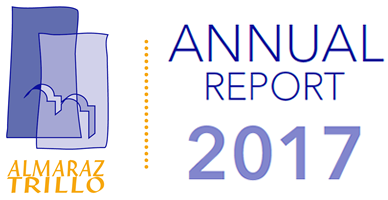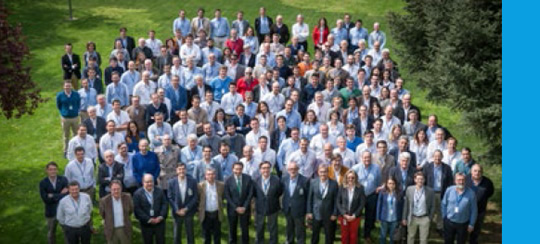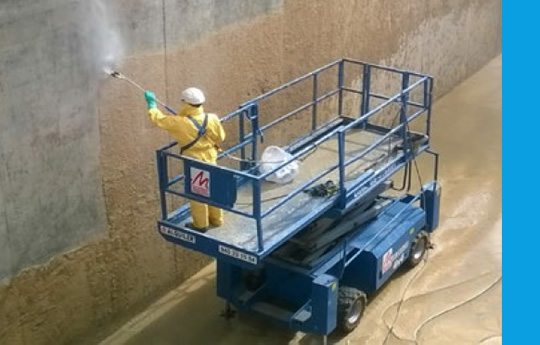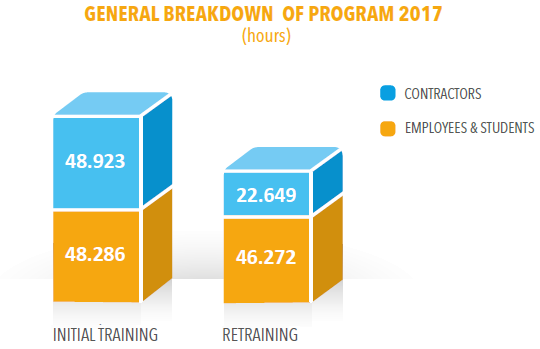
 SOCIAL
SOCIAL
PEOPLE MANAGEMENT
Our people are the main asset of Almaraz-Trillo Nuclear Power Plants (CNAT). Their collaboration, commitment and identification with the Organisation are the best guarantee for safe operation of the plants and achievement of the business objectives. Therefore, the human resources policy aims to promote a work environment that facilitates professional and personal development, with special attention to the health and safety of employees.

At 31 December 2017, CNAT employed a team of 851 professionals characterised by their experience and high qualifications: 49% have a university degree. 411 employees are located at Almaraz NPP, 345 at Trillo NPP and 95 in the Headquarters.
There were 43 new recruits during the year and in all cases prior to recruitment to the work place, they received initial training and coaching about their work place functions.
In 2017 Almaraz - Trillo Nuclear Power Plants A.I.E. has obtained the certificate ISO-10.667-2:2011: Assessment service delivery. Procedures and methods to assess people in work and organizational settings carried out by AENOR INTERNATIONAL S.A.U. with the final result of "compliant".
With an average age of 49, CNAT staff is concentrated mainly in Extremadura (48%), Castilla-La Mancha (41%) and Madrid (11%). Also female representation in the different groups within the company stands at 9.98%, and there is an emphasis on the recruitment of young graduates with a broad qualification.
It should also be noted that CNAT staff are continuously supported by personnel from external companies during normal operation of the plants and especially during refuelling.
PREVENTION OF WORK-PLACE RISKS
All accidents could and should be avoided. Safety and health of people and the integration of prevention at all levels of the Organisation are a priority for CNAT.
During 2017, there were 15 accidents at CNAT, 5 of them were considered accidents with sickleave. Promotion of awareness and dissemination to the field of matters concerning Occupational Risk Prevention require constant action. To this end, CNAT has initiated several activities this year to achieve the objective of integrating prevention into the General Management System.
With this objective, a total of 104 Prevention Observations have been carried out, and these are an effective tool to promote the integration of prevention and a facilitator for supervision of work on-site. They enable safe behaviours of people to be reinforced, and in addition improve the quality of the work directly by involving managers.
Another important measure to advance awareness of prevention has been dissemination of the “Safety Minute”. In 2017, 14 Safety Minutes were disseminated, and they were shown at all management and coordination meetings, as well as on the Intranet. This tool has enabled the lessons learned from accidents and incidents to be disseminated, as well as expectations regarding prevention of occupational hazards 20 and preventive measures for the different risks in our installations. In addition, there were awareness campaigns about the use of harnesses and tasks involving electrical risks.
Regarding the integration of prevention, participation of the line in specific meetings has been encouraged to analyse incidents, investigate accidents, plan improvements and action plans, as well as participation in the coordination of business activities.

With regard to contractors, significant efforts have been made by everyone to comply with CNAT’s guidelines on occupational hazard prevention. Several meetings have been held with managers to establish action plans to reduce adverse trends, and a preventive culture index has been defined to classify them, taking into account the number of violations, accidents, incidents and Medical Service attendances for work-related reasons.
Another relevant aspect in the year was the external evaluation of the CNAT Preventive Culture, and based on it, definition of a Strategic Plan for prevention. These measures will result in the integration of prevention with the CNAT General Management System, as well as the reduction of risks, promotion of the spirit and culture of prevention, and health and safety improvements for all professionals.
In addition, CNAT’s Prevention Service has two Health Surveillance units that supervise the health of workers at the three work centres. Specific health monitoring protocols required in accordance with the risk assessment performed by Technical Prevention for each job are applied in medical examinations. Also, this unit performs functions of health care, support in medical emergencies or accidents, and maintains Level I accreditation for caring for irradiated and contaminated casualties.
With the aim of maintaining the health of our workers at the highest quality standards, specific Health Surveillance activities, and a health promotion programme titled, “2017 Healthy Company Plan” were also introduced in the Preventive Activity Planning for 2017.
Throughout the year we continued with screening campaigns for colon cancer (occult blood in stool), oral health, melanoma prevention and dermatological and eye health pathology through non-mydriatic retinography. An article on “Recommendations for a healthy diet” was also published in the internal magazine, “Mundo CNAT”. All information sessions and campaigns have been very well received.
TRAINING
The skills of individuals working for the Almaraz-Trillo Nuclear Power Plants are one of the priority interest areas, and for that reason CNAT has permanent resources devoted to planning and developing annual training plans for each work centre, not only with regard to initial training, but also for refresher-training and training in management skills.
In 2017, 534 initial and retraining courses were provided, which resulted in 166,131 hours of training for 5,000 workers, including future plant operators (21 young students in training).
The part of the training programme dedicated to refresher-training represented 41%, and that corresponding to initial training was 59%.
During the year, 829 CNAT employees (97.4% of the total) participated in training activities, totalling 61,328 training hours, and the average training hours per employee was 74 hours. Training programmes for future plant operators prior to joining the workforce, resulted in more than 33,230 training hours during the year.
In regard to monitoring the qualification of contracting personnel, CNAT continued to encourage improvements in their training by providing support for planned training activities, and by arranging specific training sessions for these workers. In 2017, 71,573 training hours were dedicated to 4,150 workers belonging to contracting companies.

INTERNAL COMMUNICATIONS
Internal communication has a fundamental and cross-company role within CNAT. In this regard, the Internal Communication programme in the CNAT Action Plan (2017-2021) was developed during 2017 with the objective that Communications be considered a basic part of the responsibilities of CNAT’ managers.
CNAT employees use various communication channels provided by the company including the internal magazine “Mundo CNAT” and the monthly newsletter “En 5 minutos”.
During 2017, several internal communication campaigns were launched to help meet corporate objectives. For example there was the campaign “Yo soy profesional nuclear” to promote compliance with CNAT’s General Expectations, and others focused on internally disseminating the CNAT Business and Leadership Model.
 SOCIAL
SOCIAL
RELATIONS WITH SOCIETY
CNAT continues to have direct, fluid and stable relationships with institutions in surrounding areas, and in 2017 biannual meetings were held, two at each plant, with the mayors of nearby councils and with the media. All the information concerning operational results is presented at these meetings together with news about future plans and projects. 156 personalised meetings were also held with mayors of surrounding councils to study on a bilateral basis the relationships of the Plants with each municipality and potential collaboration channels. In addition, this year the management of both plants are actively involved in local Information Committees, convened by MINETAD, and they provide any information required whenever necessary.
The commitment of Almaraz and Trillo NPPs to their neighbouring communities is reflected in the cooperation agreements that have been renewed in the social-economic and environmental fields, and educational development projects.
In the same way, CNAT has renewed cooperation agreements with news and press agencies most representative of the Plant environs, and these are used to promote the training and specialisation of Information Science final year students on nuclear sourced electricity production. Also, a course on nuclear technology for media professionals is provided every year at our facilities in Trillo.
The informative actions by CNAT on nuclear energy and operation of its plants are evidenced by the welcoming of 6,883 visitors this year to the Information Centres, (2,883 at Almaraz and 4,000 at Trillo). Between the two Plants, over one million people have visited the Almaraz and Trillo installations since they began operating in 1977 and 1981 respectively. In addition, both the web site (www.cnat.es) and the blog www.energiaymas.es provide interesting information about plant activities and their environments, and contribute to this effort to expand dissemination of information about the nuclear world.
To ensure continuous improvement of the quality of products and associated services, CNAT ensures that its suppliers are aware of and participate in the company’s work processes and protocols.
Trading volume in 2017 was € 271.4 M. Of the total number of identified suppliers (973) with contract awards, 93.42% (909) are domestic suppliers.